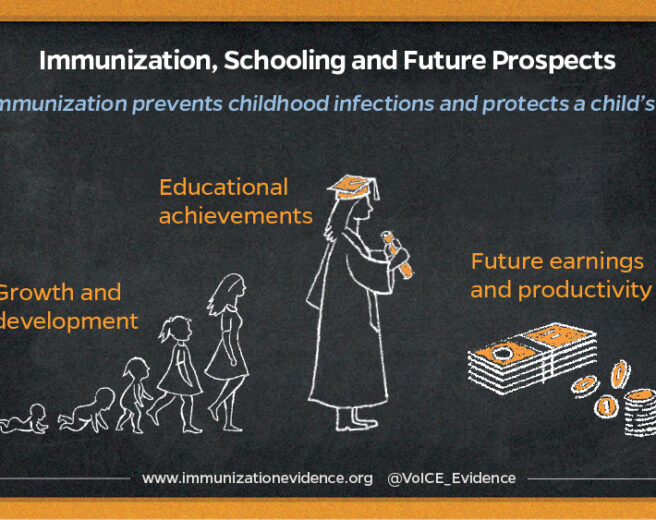
A selection of VoICE evidence in this issue
A healthy child is more likely to attend school, performs better in school and attends school for longer than a child who is often ill or has suffered permanent disabilities as a result of illness. In this Feature, VoICE explores how vaccine-preventable infections affect cognitive development and schooling, and highlights evidence of the effect vaccination can have in protecting a child’s neurologic development, educational prospects and ultimately, future productivity.
Key Messages
- Common childhood illnesses cause children to miss school. Immunized children miss less school.
- Recurring episodes of diarrhea in young childhood can delay a child from starting school and affect physical growth and normal cognitive development during childhood. Vaccine-preventable rotavirus is the most common cause of severe diarrhea.
- Immunization against measles can increase the number of years of schooling a child achieves and may also improve cognitive scores, compared to unimmunized children.
- Some vaccine-preventable infections carry the risk of long-term hearing, psychosocial and neurological disabilities that negatively impact a child’s social functioning and educational prospects.
- On average, globally, each additional year of schooling can increase a child’s future adult earnings by more than 12%.
Immunization protects our children’s future prospects
Most people think of vaccines as important for preventing specific diseases and infections during childhood, but may not realize the extent to which immunization can strengthen a child’s future prospects well into the school years and beyond. Growing evidence is illuminating the link between vaccination and improved cognitive functions, education, and ultimately, adult productivity. In essence, vaccination may help improve a child’s ability to learn, think and thrive in society as a result of educational attainment, cognitive reasoning and thinking skills.
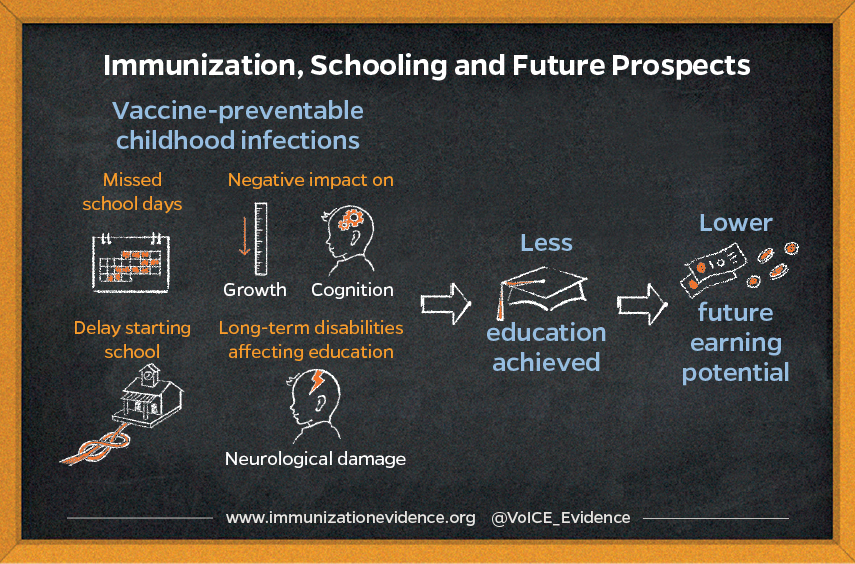
Vaccine-preventable diseases, immunization and educational attainment
Vaccinated kids miss less school
The most obvious link between immunization and education is that preventing bouts of illness means kids miss fewer school days. A study of school absenteeism in the US found that nearly 50% of absences were due to illness. A second US study found that schools that offered flu vaccine to their students reduced the risk of any child getting the flu by 30%, regardless of vaccination status. Children vaccinated against the flu missed 1.5 fewer days of school per 100 school days compared to those who did not receive flu vaccine. Thirty years ago, Varicella infections (chickenpox) caused a child to miss nearly 9 days of school, not to mention work missed by parents taking care of a sick child. But the introduction of chickenpox vaccine in 1995 has drastically reduced infections, hospitalizations and deaths from this common infection, preventing more than 3.5 million cases each year in the US, according to the CDC.
Infections and schooling delays
Rotavirus is the most common cause of severe diarrhea in young children worldwide, and researchers in Brazil found that recurrent bouts of diarrhea affect school readiness and long-term educational attainment. In children living in a Brazilian shantytown, the greater the number of episodes of persistent diarrhea before age two, the more delayed a child was in terms of school readiness. Overall, each episode of diarrhea delayed a child’s starting school by 0.7 months. Likewise, 6-10 years later, increasing episodes of diarrhea before age two predicted delays in age-appropriate educational attainment. Some infections, such as tuberculosis meningitis, although rare, significantly increase the risk of major educational delays. From a study in Western Cape, South Africa, among children who were well enough to attend school after surviving tuberculosis meningitis, more than half had failed at least one school grade.
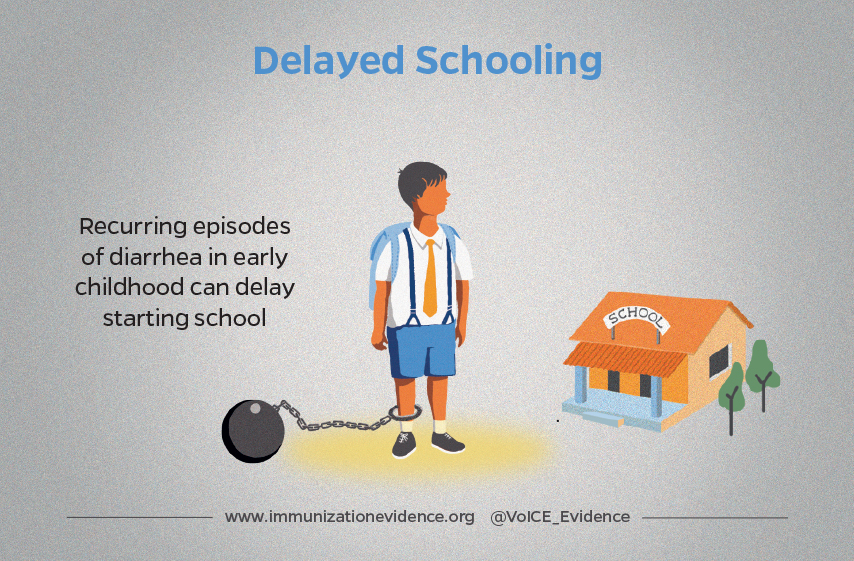
Measles vaccine can help increase extent of education received
Measles infection has a well-known prolonged negative impact on the immune system, increasing the risk of other illnesses for up to 3 years after recovering from measles. A 2019 analysis of survey data from school aged children in Ethiopia, India and Vietnam shows that children vaccinated against measles achieved 0.2-0.3 years of additional schooling compared to children who did not receive the measles vaccine. As depicted in the graphic below, note that this value is as high as 0.8 years of schooling by age 11-12. Similarly, data from a poor, largely rural South African community found that for every 6 children vaccinated against measles, one additional grade of school was achieved. In terms of initial enrollment in school, the phased introduction of measles in Bangladesh in the 1980’s resulted in boys being more than 7% more likely to be enrolled in school if they were vaccinated during the first year of life, compared to unvaccinated boys or those vaccinated later in childhood. This effect was not observed for girls, but may suggest that overall physical and cognitive health of children – as a result of their measles vaccination status – played a role in parent’s decisions to enroll their children in school.
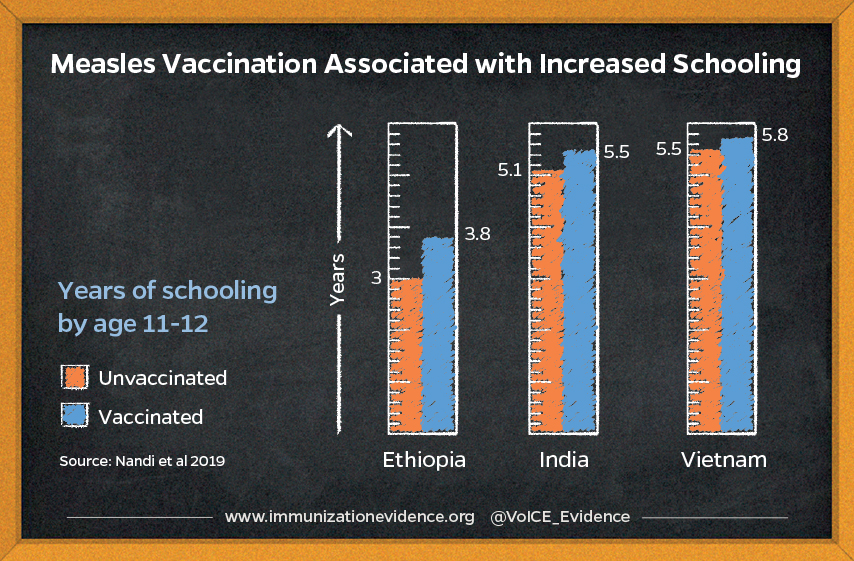
Maternal vaccination can help a child’s education
In 1974, a randomized trial of tetanus vaccine was designed to determine how well maternal vaccination would protect infants born to mothers in Bangladesh from tetanus. The study showed a significantly reduced risk of tetanus infection and death among infants born to mothers who had received the vaccine. Notably, 20 years later, researchers found a clear pattern of increased educational attainment among children whose mothers received tetanus vaccine during pregnancy. Helping to explain this observation is the fact that up to 50% of children who survive neonatal tetanus may have long-term cognitive impairment as a result of the infection.
Vaccine-preventable diseases affect the ability to learn, think and function socially
Long-term impairments resulting from vaccine-preventable infections can reduce a child’s educational prospects in several ways. Not only may the impairment itself represent a barrier to learning and future productivity, as in the case of significant cognitive delays, but educational support for children affected by these and other impairments may be lacking or nonexistent. In many places around the world, educational systems and local school are stretched exceedingly thin and unable to provide specialized assistance to children with hearing, vision, developmental or other impairments.
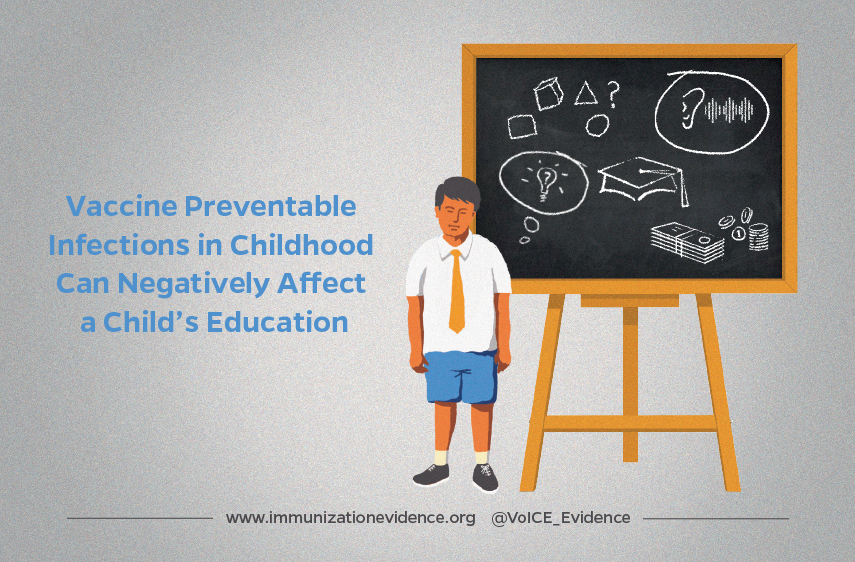
Hearing impairments
In the era before the introduction of pneumococcal conjugate vaccine (PCV) in the US, pneumococcus was the most common cause of serious and recurring ear infections in children. In comparison to life-threatening meningitis or severe pneumonia brought on by pneumococcal infection, an ear infection may seem trivial. But from the perspective of learning, ear infections can have serious consequences. Multiple ear infections in early childhood increase the risk of hearing loss, and that speech and language develops during the same time in which most children are at the greatest risk of ear infections. These factors help explain why children who spent more time with ear infections during early childhood had lower cognitive, speech, language development and even IQ than children who suffered less time with ear infections, according to a 1990 study in the US. More recently, a 2015 review of long-term impairments resulting from invasive meningococcal disease – which is relatively rare in the era of meningococcal vaccines – was significantly associated with permanent hearing loss in survivors.
Social and psychological impairments
Another set of challenges presented to survivors of vaccine-preventable diseases includes behavioral, social and psychological disorders. The invasive meningococcal disease review above highlighted evidence that children who survived invasive meningococcal infections were nearly 15% more likely to have a significant psychological disorder 3-5 years after the disease than children who did not have the disease, and two studies found a significant association between the disease and later development of Attention Deficit Hyperactivity Disorder (ADHD).
Vaccine-preventable brain and brain-related infections and long-term cognitive impairment
Vaccines can prevent several infectious causes of severe brain and brain-related infections such as meningitis or encephalitis. These types of infections are not only life-threatening but are highly associated with impaired thinking and learning after infection, sometimes for the rest of one’s life. Vaccines that prevent these infections thus help protect and preserve one’s future ability to learn, engage socially and thrive in society.Infection with Japanese encephalitis virus (JEV), which circulates almost exclusively in Asia, usually results in mild or undetectable symptoms. However, in those who develop encephalitis, a serious inflammation of the brain, 1 in 4 do not survive. Among those who do survive, up to 50% are left with permanent cognitive, psychological or neurological disabilities. An effective vaccine is available and the WHO recommends its inclusion in the national immunization schedules of heavily affected countries.Another life-threatening infection of the central nervous system is meningitis, which may have viral or bacterial causes. A large portion of the most severe meningitis infections were caused by three bacteria – pneumococcus, Hib and meningococcus – which are now largely vaccine-preventable. Pneumococcal, Hib and meningococcal infections have been responsible for the majority of meningitis deaths among children and for significant numbers of permanent cognitive disabilities, making their prevention high on the list of priorities for safeguarding a child’s future prospects. In The Gambia, 58% of children who survived pneumococcal meningitis had long lasting negative health outcomes. Half had major disabilities such as mental retardation, hearing loss, motor abnormalities, and seizures. A systematic literature review of studies across Africa found that 25% of children who survived pneumococcal or Hib meningitis had neuropsychological deficits.
The link between diarrhea, physical growth and cognition
Especially during early childhood, good nutrition and physical growth are needed for normal cognitive development. Diarrhea, especially severe or recurring diarrhea, limits the absorption of nutrients in the body, which can affect physical and cognitive development in the long-term. (See the VoICE Featured Issue on Nutrition, Growth and Development). Many rotavirus infections can be prevented through the use of existing vaccines. Prevention of diarrhea is another way to safeguard cognitive development, based on these sobering facts:
- A large longitudinal study in the Philippines found that children suffering bouts of diarrhea and respiratory infections were at a significantly increased risk of physical stunting which is associated with “poor functional outcomes such as impaired cognitive development.”
- Early childhood diarrhea was associated with diminished cognitive function 4 to 7 years later in children in a northeast Brazilian shantytown.
- A review of gut infections and their effects on physical growth and development found that for children living in impoverished areas of the world, episodes of diarrhea during the first two years of life not only negatively affected their physical growth, but could result in an IQ score 10 points lower than average by age 7.
Some vaccines have been linked to improved learning and cognitive development
Some evidence in the last 10 years points to a positive link between vaccination in early childhood and a corresponding gain in cognitive and learning tests in later childhood. A small study from the Philippines found that children immunized with 6 basic vaccines scored better on three cognitive tests (verbal, mathematics and language) at age 11 compared to children who received none of these 6 vaccines. A 2019 analysis of survey data from India, Ethiopia and Vietnam found that children vaccinated against measles scored better on cognitive tests of language development, math and reading than children who did not receive measles vaccines.
Vaccination as an investment in future productivity
Reporting on the Philippine study of cognition and vaccination, David Bloom and colleagues at Harvard University note that improvements in a child’s health translate into better earning potential and productivity as an adult, and thus describe vaccination as “an investment in human capital”, highlighting several studies that support this idea. Educational attainment is an important part of the equation for reaping the rewards of such investments. A 2014 World Bank review of the returns to schooling worldwide found a significant positive relationship between additional years of schooling and future adult wage earnings. Not only were the returns from schooling greatest in low- and middle-income countries, but the highest returns to schooling came from the primary years of education – years in which the influence of early childhood illnesses is the strongest. On average across Africa, the report concludes that an additional year of schooling would yield a 12.4% increase in future adult earnings.A healthy child is more likely to attend school, performs better in school and attends school for longer than a child who is often ill or suffering permanent disabilities as a result of illness. The list of consequences from vaccine-preventable illnesses is long and frightening. Each threat erased from that list by vaccination is another hurdle removed from a child’s path to an education and a full and productive adulthood.
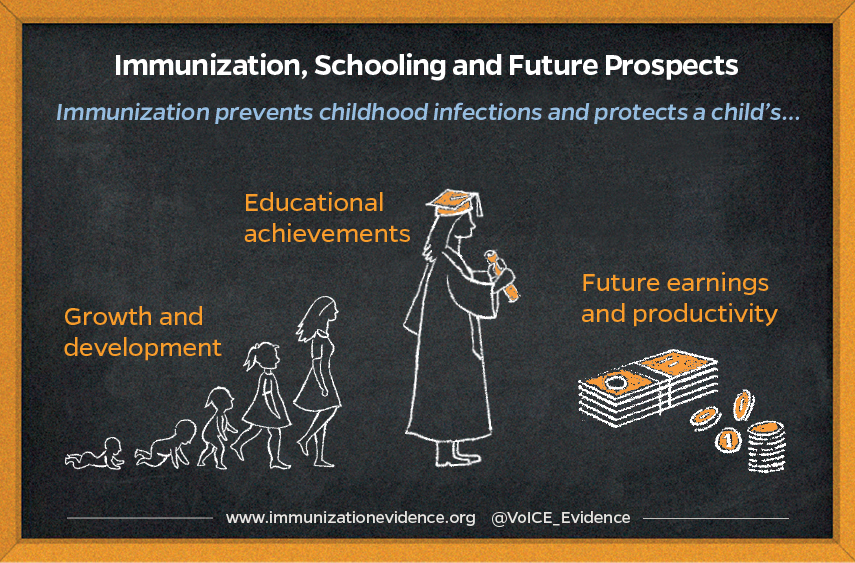
Commentary from the VoICE editors
The literature investigating the linkages between immunization, education and cognition represents a complex web of research areas spanning epidemiology, neuroscience, economics, education and demography. Studies specifically and quantitatively looking at the relationships between vaccines and education or cognition are relatively few, and some are older than the literature typically covered in VoICE. Although the positive link between immunization and educational attainment is generally accepted, the lack of new studies on this topic highlights the need for additional focus on this area of study. Although the complexity of these linkages makes quantifying the effect of immunization on education and future productivity difficult, all the literature reviewed in VoICE demonstrates a clear positive – and logical – relationship between immunization and improvements in thinking, social development, schooling and educational success.
